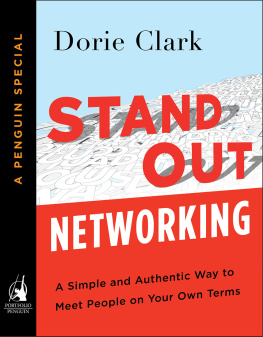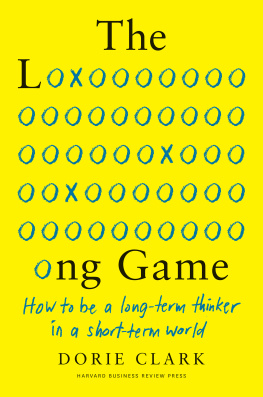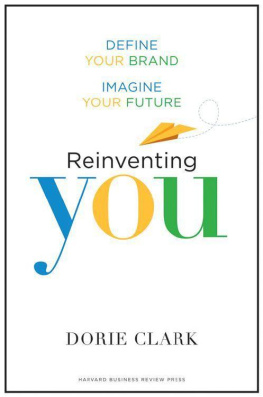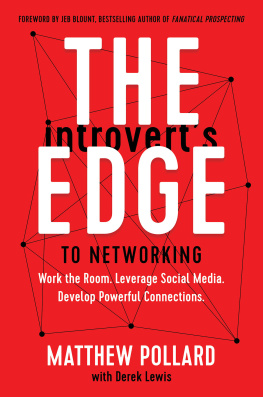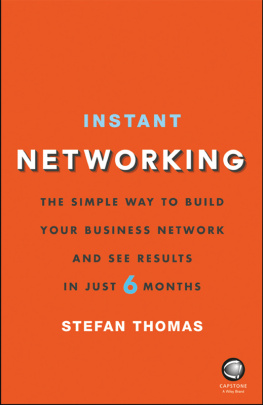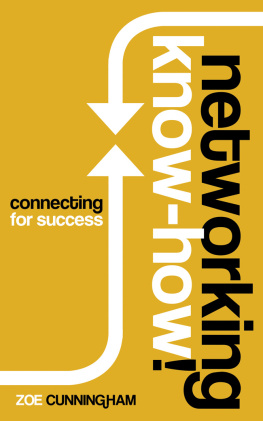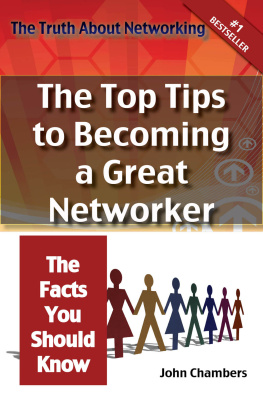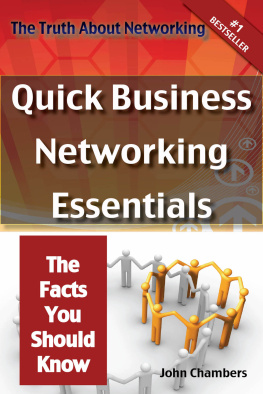Dorie Clark is an adjunct professor of business administration at Duke Universitys Fuqua School of Business and the author of Reinventing You and Stand Out . A former presidential campaign spokeswoman, she is a frequent contributor to the Harvard Business Review, Forbes, and Entrepreneur. Recognized as a branding expert by the Associated Press, Inc., and Fortune, Clark is a marketing strategy consultant and speaker for clients including Google, Microsoft, Yale University, Fidelity, and the World Bank. You can receive her free forty-two-page Stand Out Self-Assessment Workbook or follow her on Twitter .
Penguin supports copyright. Copyright fuels creativity, encourages diverse voices, promotes free speech, and creates a vibrant culture. Thank you for buying an authorized edition of this book and for complying with copyright laws by not reproducing, scanning, or distributing any part of it in any form without permission. You are supporting writers and allowing Penguin to continue to publish books for every reader.
While the author has made every effort to provide accurate telephone numbers, Internet addresses, and other contact information at the time of publication, neither the publisher nor the author assumes any responsibility for errors, or for changes that occur after publication. Further, publisher does not have any control over and does not assume any responsibility for author or third-party Web sites or their content.
Introduction
You make hard choices every day. With your in-box overflowing, who do you say yes to? Which networking coffees, or dinner invitations, or informational interviews do you choose? Who are you willing to introduce to potential clients, or hiring managers? Who will you extend yourself for?
Im willing to bet its almost never a stranger.
In a world where so many people are clamoring for our attention, we prioritize our friends, our trusted colleagues, and the people they refer to us.
It was less than two months to my book launch, and I was stretched thin, turning down almost every nonessential obligation. But when my friend Robin asked if Id meet with her mentee, I said yesbecause it was Robin asking. When my friend Issamar wanted an introduction to a magazine editor, I made it happen, even though it meant taking the time to comb through his submission and offer feedback to ensure his pitch fit the publication. And when my friend Peter had a book published, I preordered a copy, wrote an Amazon review, and invited him to a dinner where he connected with a prominent podcaster. Thats what you do for your network, and what a robust network can do for you.
You may notice, too, that I referred to everyone as my friend. That doesnt mean we hang out all the time, or that weve known each other for decades. But it does mean that I genuinely like and respect them, and value them as people, not as job titles or for the transactional benefits of what they can get me. For me, networking is one of the great joys in my life, because it allows me to meet the best and most interesting people I know.
But for many professionals, its a distressing prospect. Some are overwhelmed at the work it requires. Introverts fear the social time they must invest. Still others dislike even the word networking. Its too sullied, they sayredolent of sleazy operators and Machiavellian maneuverings. As Harvard Business School professor Francesca Gino and her colleagues describe, networking can even make people feel dirty.
The networking that she studied was networking with the goal of advancementthat is, networking because you want something from someone. Its no sin to network because youd like to meet potential clients or grow your business; in fact, thats often the only way to do it. But the instrumental view that some holdseeing people as a means to an endis damaging. This distorted image stops the best people from networking, because they dont want to treat others that way, and it encourages the worst to act in an obnoxious manner because they think thats what theyre supposed to be doing.
This book advances a very different view of networkingthat the real goal, whether youre meeting at a conference or online, is to turn a brief encounter into a real, long-lasting, and mutually beneficial relationship. You cant swap business cards at a cattle-call function and book a multimillion-dollar contract a few days later. For any meaningful business transaction, trustbuilt up over timeis the essential ingredient. Its premature and distasteful to focus on the end goal of wresting dollars from someone. Instead, with networking, the journey is the destination.
Rightly understood, networking is a way of living your life with integrity, helping others, and benefiting in proportion to the amount you do and the way you navigate the world. People want to help others who are kind and helpful. Thats not a gimmick; its a calling to be our best selves.
Being your best self while networking requires a willingness to blur the lines between the personal and the professional. Networking isnt just about growing your business; its about expanding your life with the kind of interesting people youd like to surround yourself with. Not every contact will pay off in dollars and cents. Some people you wont click with at all; others may become lifelong friends; still others may hire you or become a client. Whoever the contact may be, thoughtfulness, persistence, and consistency will enrich the relationship.
Because networking isnt just a business strategyrather, its the cornerstone of every relationship in our livesits a relief to recognize that theres not just one way to do it. If youre an extrovert, go ahead and spend all night ricocheting around networking events and conference parties. If youre an introvert, its OK to hole up in your room and write a blog post instead. The goal is to find some way of connecting with others and making yourself known; it doesnt have to be the same way as everyone else.
In the following pages, drawing on a series of interviews and essays Ive written for Forbes over the past several years, Ill outline a framework for relationship building that can work for both extroverts and introverts. Ill teach you how to be excited about networking, create a positive connection, perfect the art of the follow-up, and eventually turn an initial meeting into something lasting. Well also cover how to repair relationships that may have started badly or gone off the rails, and how to pay it forward to others by honing your skills as a connector.
In my own life, networkingwe could really just call it developing and maintaining connections with cool peoplehas paid enormous benefits. For the first five years of running my marketing consulting firm, almost every single piece of business I had came from either personal connections or direct referrals from them.

